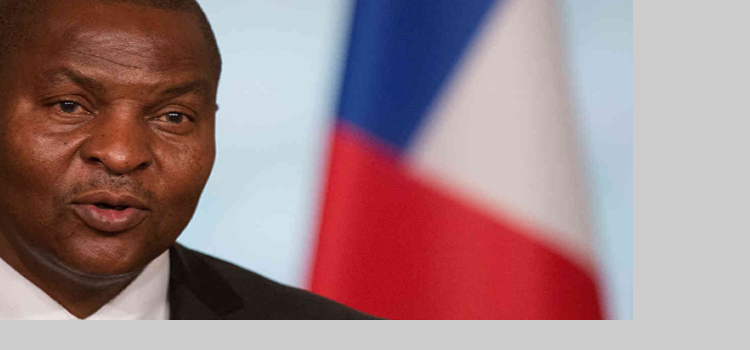By Journalists For Justice
Thousands of victims of war in Central African Republic are hoping president, Faustin Archange Touadéra, will ensure they get justice.
Touadéra, who was sworn at the end of March this year, vowed to address some of the atrocities the country has faced after years of war precipitated by coups. Since independence from France in 1960, CAR has undergone numerous coups with civilians paying a heavy price for power struggles. Thousands of people have died and others displaced. Thousands of women, girls and men have also been sexually violated.
Not a new comer in politics, Mr Touadera, a former prime minister is expected to fast-track initiatives started by the transitional government of Catherine Samba Panza formed in 2014
to avert a bloodbath after Michel Djotodia was forced to step down. Djotodia had seized power from Francois Bozize in 2013.
Panza referred the situation in the Central African Republic to the International Criminal Court (ICC) and passed a law creating a Special Criminal Court within the national justice system to complement the work of ICC. Touadéra is expected to make the Special Criminal Court a reality to investigate and prosecute grave human rights violations committed since 2003 until 2012 when sectarian war between a Muslim group known as Seleka and a Christian one, anti-Balaka, flared up.
The Central African Republic has been gripped by lawlessness since Seleka, a mainly Muslim alliance of anti-government rebel militias, overthrew Christian President Francois Bozize.
“During the last crisis that engulfed the country in 2012, armed groups known as Seleka and anti-Balaka have committed widespread abuses against civilians, including killings, sexual violence, and destruction of private, public and religious properties, causing mass displacement. Those responsible for these crimes have not yet been brought to justice,” says a group of 21 civil society organisations among them Amnesty International.
The groups say during the campaigns Touadéra, promised to hold to account those responsible for serious crimes.
Eyes will be on the new president to see if he will hold his former political ally, Bozize and former military commander, Djotodia, who led a coup accountable for murder, rape and other atrocities.
According to Amnesty International, lack of investigations or justice in CAR for past atrocities has contributed to the absence of an effective and independent justice system and the inability of the security forces to protect victims, witnesses, members of the judiciary or the wider population from violence or retaliatory attacks.
“Lack of secure detention facilities has meant that, even when arrested, those suspected of committing crimes under international law and human rights abuses frequently escape,” says the rights group.
Human Rights Watch (HRW) has documented and received reports of rapes carried out by both sides in the recent crisis.
“Most women raped by both Seleka elements and anti-balaka were done so at gunpoint, often times after looting. The endless violence the population has endured throughout the country has broken down social norms, but women and girls who have been raped are perhaps the most affected,” HRW Lewis Mudge, Central African Republic analyst was quoted as saying last year.
A 2015 UN commission of inquiry report found that as many as 6000 people may have been killed over the past three years of fighting, about 900,000 displaced from their homes and hundreds of women and girls raped. And this is just part of the atrocities and impunity that the new president is expected to address. The country has been marred by decades of military coups and lawlessness.
Consequently, the International Criminal Court is investigating allegations of crimes against humanity, war crimes, the use of child soldiers, and abuses including rape and murder.
In keeping his promise during the campaigns, Touadera is expected to fully cooperate with ICC to bring to justice those culpable.
The victims are also waiting to see how the new president will handle the issue of reparations and reconciliation at the national level especially among Christians and Muslims.
There are expectations that ICC may order former Democratic Republic of Congo Vice President, Pierre-Jean Bemba, who was found guilty of war crimes and crimes against humanity in CAR on account of command of responsibility to pay reparations.
Bemba’s involvement in CAR started in 2002, President Ange-Felix Patasse invited rebels of the Mouvement de libération du Congo (MLC) headed by the former DRC politician to shore up his government against André Kolingba, who tried to unseat him in a bloody, abortive coup on 28 May 2001. Bemba’s fighters estimated to have been 1,500 ran amok – looting, killing men and raping women.
The situation worsened in October 2002 when rebels headed by Francois Bozize – then army chief of staff seized power. Patassé reached out to Bemba for support and the MLC soldiers raped women and sodomised men. During Bemba’s trial at the ICC, the prosecution gave detailed accounts of how MLC troops committed many acts of rape, murder, and pillaging over a large geographical area in the CAR.
Read about Bemba’s involvement in CAR and why he was arrested by ICC:
Women and girls of all ages – some younger than six years, some older were raped and got pregnant or contracted HIV.
There is also the issue of sexual violations by UN-peace keeping mission. Hundreds of girls and women have reported being raped by the soldiers, but so far, no action has been taken.
Since the UN peacekeeping mission started in 2014, soldiers have been formally accused of sexually abusing or civilians mostly underage girls. Read more:
UN Secretary General Ban Ki-moon has called sexual abuse by peacekeepers “a cancer in our system.”
Nearly 1,000 troops whose units have been tied to abuses have been expelled, or will be soon.
Also read: Security Council extends mandate of UN Mission in Central African Republic







